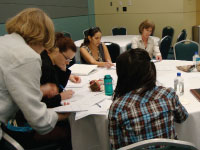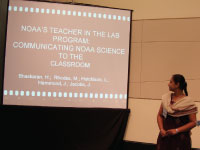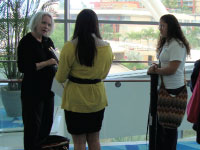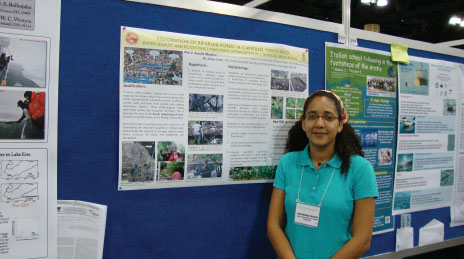ASLO Aquatic Sciences Meeting
February 13 – 18, 2011
San Juan, Puerto Rico
Over 1,700 people attended the 2011 ASLO Aquatic Sciences Meeting in San Juan, Puerto Rico. The conference featured exhibitors, oral and poster presentations, and workshops.

Workshop: Understanding and Using Network Science for Better Collaboration |
COSEE Network Staff convened several oral and poster sessions and workshops focused on education and outreach programs and opportunities:
SUNDAY, FEBRUARY 13
Understanding and Using Network Science for Better Collaboration
Special ASLO Workshop on Network Science
Bob Chen, Liesl Hotaling, Adrienne Sponberg
10:30 to 14:30 - PRCC, Room 203
Ocean science has become a highly collaborative enterprise. Advances in the science of networks, both theoretical and applied, now allow a greater understanding and visualization of networks. Networks help support the collaboration that is required to achieve complex goals in ocean research and education that are difficult to achieve by more conventional approaches. This workshop is intended to introduce network science and the its current and potential applications in empirical and scientific endeavors. Dr. Karen Stephenson, President of Netform International and a featured thought leader by Malcolm Gladwell, author of The Tipping Point, will present the story of network science and a few of its provocative applications to academic and business settings. Participants will have the opportunity to work in small groups to discuss how this new knowledge may impact their proposals, research projects, or career trajectories. Lunch will be provided to all participants.

Presentation during the S26 Improved Broader Impacts = Enhanced Scientific Impacts Session |
MONDAY, FEBRUARY 14
S01 ASLOMP Student Symposium
Ben Cuker, Deidre Gibson
Oral Presentations: 08:00 – 10:00, 13:30 – 20:00, Room 208B
TUESDAY, FEBRUARY 15
S25 Research Experiences of Undergraduates in Aquatic Sciences
Poster Presentations: Exhibit Hall
S26: Improved Broader Impacts = Enhanced Scientific Impacts
Liesl Hotaling, Linda Duguay
Oral Presentations: 08:00 - 10:00, 13:30 – 15:30, Room 208A
Poster Presentations: 16:00 - 18:00 - PRCC, Exhibit Hall
Public Policy Workshop: Getting Lawmakers to Hear Your Message: 12:00 to 13:30 - PRCC, Room 208 A
S01 ASLOMP Student Symposium
Poster Presentations: Exhibit Hall
Demonstration Station: Physical Concepts in Oceanography: An Inquiry Based Approach: 16:00 - 18:00 - PRCC, Exhibit Hall

Attendees speaking with Dr. Karen Stephenson after her presentation |
WEDNESDAY, FEBRUARY 16
S26 Improved Broader Impacts = Enhanced Scientific Impacts
Liesl Hotaling, Linda Duguay
Oral Presentations: 08:00 – 10:00, Room 208A
S76 Increasing Diversity in the Ocean Science Workshop: Effective Recruitment and Mentoring
Oral Presentations: 13:30 – 15:30, Room 208A
S54 Student Engagement in Education and Public Outreach
Liesl Hotaling, Linda Duguay, Deidre Gibson
Oral Presentations: 16:00 – 18:00, Room 208A
Engaging Our Students Using Real-Time Data: From Platforms to Homemade Sensors:
Workshop (George Matsumoto):18:00 to 20:00 - PRCC, Room 208A
THURSDAY, FEBRUARY 17
S25 Research Experiences of Undergraduates in Aquatic Sciences
Poster Presentations: Exhibit Hall
S54: Student Engagement in Education and Public Outreach
Conveying scientific research to the public is increasing in importance to scientists and society. Students preparing for a career in science also need to hone their abilities to convey their research to non-expert audiences. Since scientists are required to include education and outreach activities to obtain or leverage funding and strengthen status within peer groups, these skills will increase career potential. In addition, students are often intrinsically motivated to share their research with the world. This session will solicit contributions from students (high school through postdoctoral) that provide examples of transferable and tractable activities, which broaden the awareness of outreach activities such as work with citizen scientists groups, and formal and informal science education institutions. Presentation proposals should include how the student experiences benefitted the local population and how the experiences could benefit their careers in science. Suggested areas for presenters to address can include but are not limited to: 1) on-line educational activities and/or resources and their successful use with non-expert audiences; and 2) activities that may inspire and empower other students to reach out into the community.
Poster Presentations: Exhibit Hall
Demonstration Station: Physical Concepts in Oceanography: An Inquiry Based Approach: 16:00 - 18:00 - PRCC, Exhibit Hall

Student poster during the S54 Student Engagement in Education and Public Outreach session |

